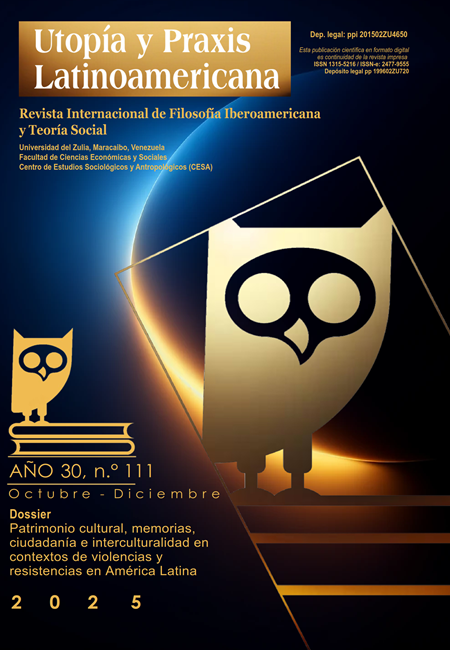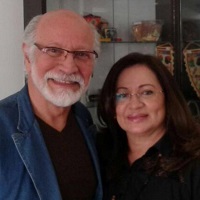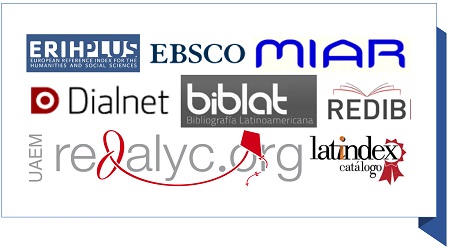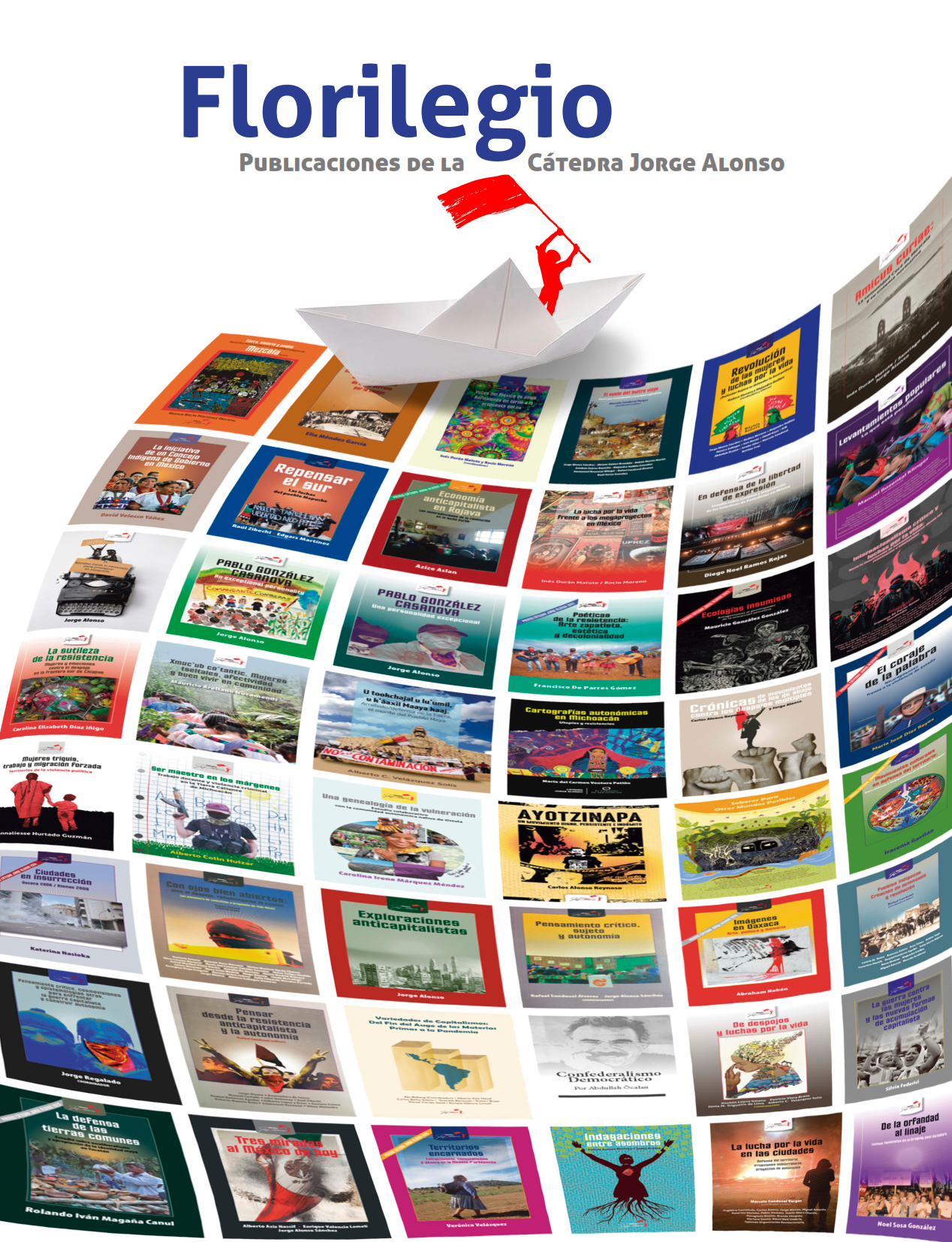Memory, Archives of Resistance, and the Role of CAMeNA: Interview with Beatriz Torres Abelaira
Abstract
This article presents an interview with Beatriz Torres Abelaira, a Chilean exile and founder of the Centro Académico de la Memoria de Nuestra América (CAMeNA) at the Universidad Autónoma de la Ciudad de México (UACM). The conversation traces her biography, marked by the 1973 Chilean coup d'état, her exile, arrival in Mexico, and her work in recovering, organizing, and disseminating archives related to historical memory and human rights struggles in Latin America. Torres recounts the acquisition of the Gregorio Selser archive as the cornerstone of CAMeNA, as well as the incorporation of emblematic collections such as those of General Gallardo, Ernesto Capuano, Sergio Méndez Arce, the Comité ¡Eureka!, and various LGBT archives. The text highlights memory as a political battleground and a tool of resistance against silences imposed by authoritarian regimes and limited democratic transitions. It also reflects on the importance of guaranteeing free access to archives, understood as instruments of truth and justice, and of preserving a documentary heritage that contributes to building a history narrated from the voices of the oppressed.
References
AGUAYO, S. (2018). 1968: Los archivos de la violencia. Grijalbo.
AYLWIN, P. (1998). El reencuentro de los demócratas: Del golpe al triunfo del NO. Editorial Planeta.
BENJAMÍN, W. (2008). Tesis sobre la filosofía de la historia. En W. Benjamín, Discursos interrumpidos I (pp. 175–191). Taurus. (Obra original publicada en 1940).
CAMENA-UACM. (s. f.). Archivo Histórico del Comité ¡Eureka!. Universidad Autónoma de la Ciudad de México.
COLLIER, S., & SATER, W. F. (2004). A history of Chile, 1808–2002. Cambridge University Press.
CONSTABLE, P., & VALENZUELA, A. (1991). A nation of enemies: Chile under Pinochet. W. W. Norton & Company.
CONTRAPODER. (2019). Perfil: Raquel Sosa Elízaga, titular de las Universidades del Bienestar Benito Juárez.
DUSSEL, E. (1998). Ética de la liberación en la edad de la globalización y la exclusión. Trotta.
DUSSEL, E. (2007). Política de la liberación. Historia mundial y crítica. Trotta.
EL PAÍS. (2025, 3 de julio). CAMeNA y Casa Centroamérica, las iniciativas que hilan décadas de exilios en México. El País.
GACETA UACM. (2014). Informe de actividades del rector interino Enrique Dussel Ambrosini (2013–2014). Universidad Autónoma de la Ciudad de México.
GUEVARA, G. (1998). La democracia en blanco y negro: El movimiento estudiantil de 1968. Cal y Arena.
HARMER, T. (2011). Allende’s Chile and the Inter-American Cold War. University of North Carolina Press.
HERNÁNDEZ, M. (2014). Hugo Zemelman: Pensamiento crítico y construcción de futuro. Revista Polis, 13(39), 1–5. https://doi.org/10.4067/S0718-65682014000300001.
HUNEEUS, C. (2000). El régimen de Pinochet. Editorial Sudamericana. Chile.
JELIN, E. (2002). Los trabajos de la memoria. Siglo XXI Editores. Argentina.
JELIN, E. (2017). La lucha por el pasado: Cómo construimos la memoria social. Siglo XXI Editores. México.
LOVEMAN, B. (2001). Chile: The legacy of Hispanic capitalism (3.ª ed.). Oxford University Press.
LOVEMAN, B., y LIRA, E. (2000). Las suaves cenizas del olvido: Vía chilena de reconciliación política 1814–1994. LOM Ediciones.
Luque, J., Sandoval, F., Pérez, J., y García, M. (2025). Las democracias latinoamericanas. Entre la igualdad política y la justicia social. Fondo Editorial Ana María Campos. Mérida. Venezuela.
O´DONNELL, G. (2007). Disonancias, críticas democráticas a la democracia.
O’DONNELL, G. (2010). Democracia, agencia y estado. Teoría con intención comparativa. Prometeo, Buenos Aires, Argentina.
OBSERVATORIO ALAS. (2021). Raquel Sosa. sociologia-alas.org.
PENCHASZADEH, A., y SANDER, J. (2021). Ciudadanías migrantes en Argentina: ejercicios democráticos (pos)nacionales. En: Ciudadanías alternativas. Hacia otro rol ciudadano. Fundación La Hendija. Entre ríos. Argentina.
PONIATOWSKA, E. (1971). La noche de Tlatelolco. Era.
RICOEUR, P. (2004). La memoria, la historia, el olvido (Trad. A. Neira). Fondo de Cultura Económica.
RODRÍGUEZ, T., y SERMEÑO, Á. (2006). Pensar la universidad, hacer universidad. Entrevista con Manuel Pérez Rocha. Andamios, 3(5).
SANDOVAL, F. (2022). Reneocolonialismo y reinvolución. Sapientiae: Revista de Ciencias Sociais, Humanas e Engenharias, 8(1), 170-183. https://doi.org/10.37293/sapientiae81.13.
SARLO, B. (2005). Tiempo pasado: Cultura de la memoria y giro subjetivo. Siglo XXI Editores.
SIAVELIS, P. (2000). The president and congress in postauthoritarian Chile: Institutional constraints to democratic consolidation. Penn State University Press.
SOLANO RAMÍREZ, G., LUQUE BRAZÁN, J. C., & GRACIDA González, H. (2016). Ayotzinapa: Entre la fragilidad institucional y la violencia del crimen organizado. Anuario Latinoamericano – Ciencias Políticas y Relaciones Internacionales, 3, 219–238. https://doi.org/10.17951/al.2015.3.219.
SPUTNIK MUNDO. (2025, 14 de julio). “El Plan Cóndor sigue estando vigente, nunca el pasado fue más presente que ahora”: Entrevista con Beatriz Torres.
STERN, S. (2010). Reckoning with Pinochet: The memory question in democratic Chile, 1989–2006. Duke University Press.
TRAVERSO, E. (2012). El pasado: Instrucciones de uso. Marcial Pons.
TREJO, R. (2013). 1968: La comunicación social y la violencia de Estado en México. Comunicación y Sociedad, (19), 15–43. https://doi.org/10.32870/cys.v0i19.105.
TROUILLOT, M. (1995). Silencing the past: Power and the production of history. Beacon Press
UNIVERSIDAD AUTÓNOMA DE LA CIUDAD DE MÉXICO. (s. f.). Centro Académico de la Memoria de Nuestra América. UACM.
UNIVERSIDAD AUTÓNOMA DE LA CIUDAD DE MÉXICO. (s. f.). Perfil de Manuel Pérez Rocha. Publicaciones UACM.
UNIVERSIDAD DE PLAYA ANCHA. (2013). Muere el latinoamericanista Hugo Zemelman Merino. UPLA Noticias. https://www.upla.cl/noticias/2013/10/04/muere-el-latinoamericanista-hugo-zemelman-merino/.
WINN, P. (2014). Victims of the Chilean miracle: Workers and neoliberalism in the Pinochet era, 1973–2002. Duke University Press.









